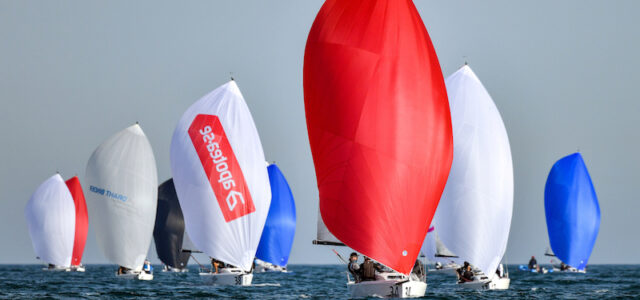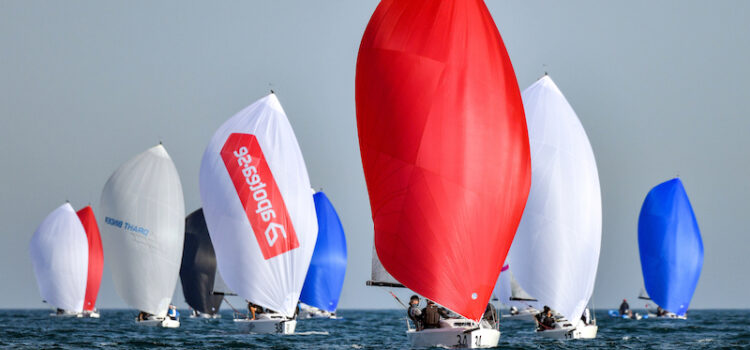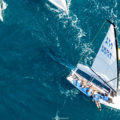

J/70 European Championship, the overall winner is Good to Go and the title goes to Sail Cascais
Breaking newsEnglishIn evidenzaJ-70MonotipiaVela 11 Settembre 2023 Zerogradinord 0

Weymouth – Doug Rastello and his USA team on ‘Good To Go’ have won the J/70 European Championship hosted by the Weymouth and Portland National Sailing Academy. While the American crew were the outright winners of the 48-boat keelboat fleet, it was the runners-up from Portugal, Vasco Serpa and Solyd Sailing Team/SailCascais who become the European Champions.
For the second day in a row there was barely a breath of wind across Portland Harbour or Weymouth Bay and the race committee made a call for abandoning racing at midday. It was a frustrating but unavoidable conclusion to the regatta which saw five races take place in light and shifty conditions out in the Bay. There were no complaints about the temperature in the late 20s but the light easterly gradient made it impossible for afternoon sea breezes to develop on the south coast of England.
Winning races was not the winning ingredient
While five races was well short of the target for the championship, there could be no doubting that Rastello’s crew proved worthy winners of the regatta. Their scores of 11,3,2,7,6 were significantly more consistent than the rest of the fleet, the Americans racking up just 18 points with discard compared with 29 points for the Portuguese in second overall. It’s a sign of just how tricky the conditions were, that the top-placed boat to win an individual race was the Mexican entry in fifth overall, Zaguero skippered by Ignacio Perez.
Rastello had brought together a group of friends who had never sailed together before but he knew he had the right ingredients for success. “I needed to get the dream team together and I think we did. We had the right chemistry and it was a really good team, solid,” said Rastello.
With such a talented team of John Wallace, Morgan Trubovich and Steve Hunt there might have been a risk of too many cooks spoiling the broth, but Rastello said the communications loop and decision making process worked well on board. “Everybody respects each other’s role and we talked about that before the regatta. We agreed that the best way you put a team together is to have everyone do their own job and not tell others how to do theirs. I have done tactics in the past, but this week I just listened to where Steve told me to go, and it seemed to work.”
Portuguese on the rise
Vasco Serpa was delighted to have finished in second place, especially with so few points separating 2nd to 12th place overall. More races on the final day would have made it hard for the Portuguese to defend their position and Serpa admitted the final hours of waiting had been nervous times before their European title was assured. He paid tribute to his crew, Diogo Pinto, Paolo Manso and Hugo Rocha. “Last season we did OK but we felt we had some deficiencies as we were still learning how to make the J/70 go fast. So we shortened the learning curve and brought in some top sailors.
“Paolo finished fourth in last year’s Worlds with a Spanish crew, and Hugo [470 Olympic bronze medallist] is perhaps the best sailor in Portugal and works for North Sails. He has the technical knowledge and he brings a winning mentality to the race course. It was very tough racing against a really hot fleet, so we’re very happy with the result. I raced Lasers back in the 1990s, went to the Olympics [7th in Atlanta 1996], took a few years away from the sport and when I came back I wanted to compete with the best. The J/70 is the class that gives me that possibility.” Finishing 3 points behind the Portuguese and taking the final podium place was Denizcik, a Turkish entry skippered by Gulboy Guryel.
Corinthian shoot-out
Of the 48 entries, 32 were Corinthian, a typically high proportion of the J/70 fleet in Europe. It was a fierce battle for top honours in the Corinthian division with just 3 points separating the top crews from Sweden, Switzerland and Great Britain who took 8th, 9th and 10th places overall. Pär Svärdsson’s crew on Happy Yachting came out ahead for Sweden, with Stefan Seger’s Aiola in second and Jonathan Calascione’s Calypso in third.
Svärdsson was delighted with his Corinthian victory and said one of the enjoyable aspects of racing the J/70 was also being able to race against some of the world’s best professionals, America’s Cup veterans and Olympians and so on. “It’s good fun racing against sailors of that standard, especially if you beat them,” he smiled. “I mean, it doesn’t happen that often but it’s a good incentive to improve. Racing against great sailors always makes you a better sailor in yourself.”
Although disappointed to have missed a chance to attack for the win, Calascione was still satisfied with his team’s performance across the five races. “We led off the pin end of one race and looked across, thought about tacking, thought we’d consolidate for another 50 metres and then tacked. By the time we had done that, the wind filled in from the other side of the course and we went from first to last in the blink of an eye. It’s very hard to deal with those kinds of challenges, but it’s the nature of such tight, competitive racing that brought me to the J/70 class and keeps me here. The Corinthian scene is getting stronger and stronger and on our day we feel we have the potential to beat anybody, the professionals included.”
Gliddon is top woman
First youth team were Delft Challenge from the Netherlands, skippered by Mees de Graaf, and finishing 17th overall. The top female helmsman was Josie Gliddon who steered Charlie Thompson’s Brutus II to fourth overall, missing the podium on tiebreak. Gliddon doesn’t like being defined as a female sailor, only as a sailor, but does believe the nature of J/70 racing makes it possible for competitors of both genders to race on very equal terms.
“There’s not a huge amount of load in these boats,” said Gliddon, who also races the Cape 31 and International Moth. “I’m doing the steering, and I’ve done the mainsheet on the J/70 too. There’s a bit of load in the gennaker sheet but it’s all quite doable. Whether you’re a man or a woman isn’t really the issue. It’s a level playing field in the J/70.”
Phil Taylor, sailing secretary for the UK J/70 Class, paid tribute to his fellow competitors and thanked all the many people that made the event happen at Weymouth and Portland National Sailing Academy, not least the volunteers. “Despite the challenges with the lack of wind we’ve enjoyed a great week here, and there’s lots to look forward to in 2024, with the next Europeans in Tuscany, the Corinthian Worlds in Copenhagen and the Worlds in Palma. The class is in great shape.”





No comments so far.
Be first to leave comment below.